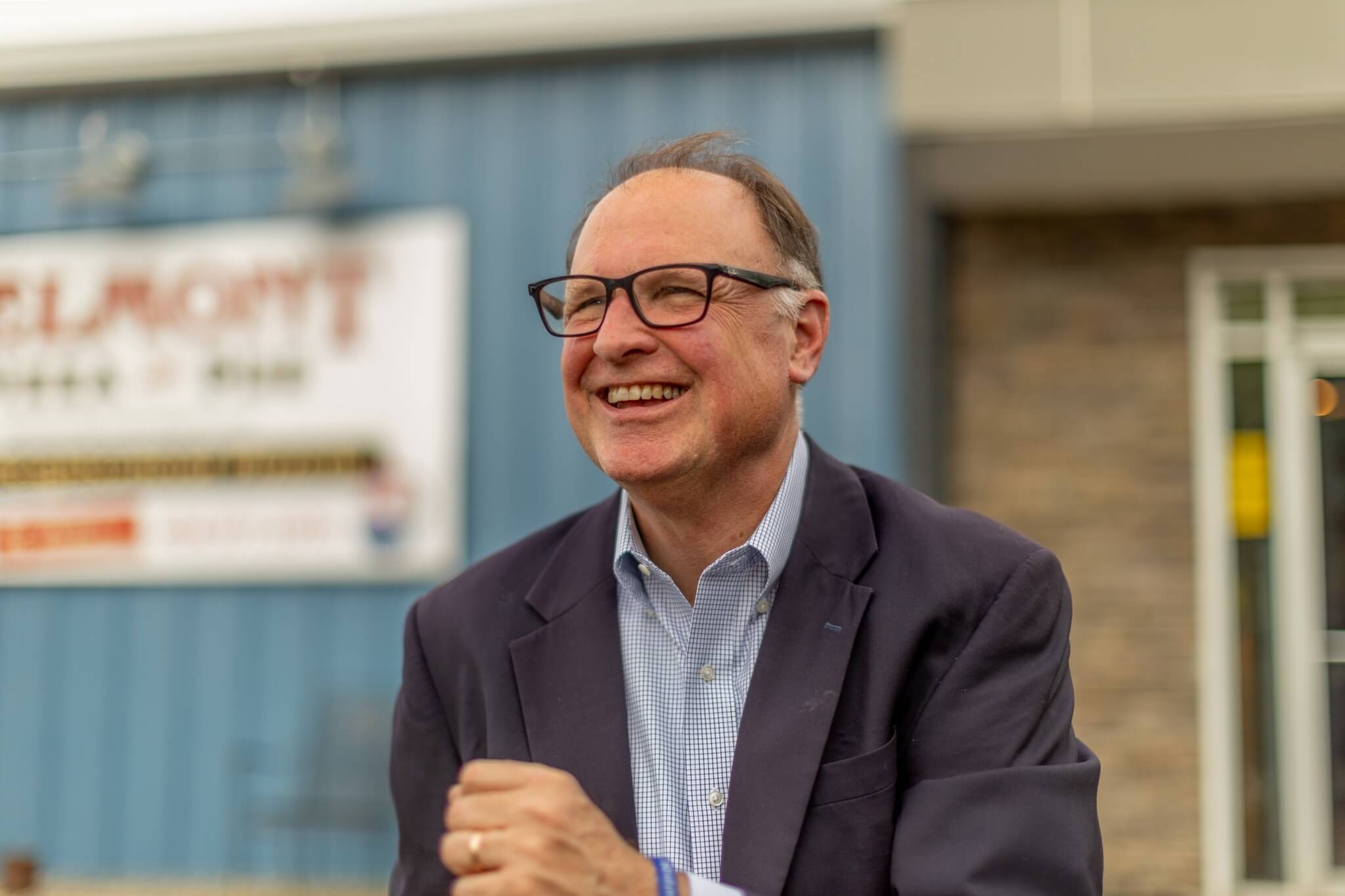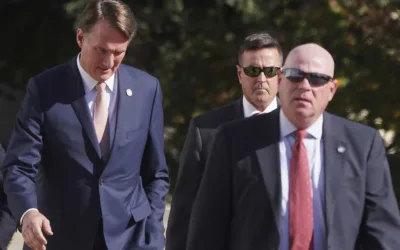
Photo: Creigh Deeds Facebook
State Sen. Creigh Deeds has been serving Virginia for more than 30 years, and he recently made the news when his beagle, Mila, went on a two week excursion after getting loose in Albemarle County.
Ahead of the June primary, where incumbent Deeds is being challenged by Del. Sally Hudson in the newly redrawn state Senate District 11 – which covers parts of the city of Charlottesville, as well as Albemarle, Amherst, and Nelson Counties, and a part of Louisa County – Dogwood caught up with the state senator.
On Education
“In Virginia, we’ve got…such a checkered history,” Sen. Deeds said. That comment came on the heels of a turbulent period during which the Virginia Department of Education was reviewing proposed changes to its history and social sciences standards that received final approval in April.
“We owe it to children, we owe it to the future generations to tell the truth to tell the whole story. The good, the bad, the ugly…to not tell an incomplete story,” he said, while noting that he was worried that what has been happening in Florida in regards to book bans, claims of “woke” education, and the DeSantis’ repressive “Don’t Say Gay” law, is starting to happen in Virginia, especially when it comes to textbooks and library books.
When asked if Virginia’s educational system could end up like Florida’s in the near future, Deeds said, “I think certainly, that’s possible, but you [have] to remember in Virginia, we have a governor [who is] very powerful, but they’re limited to one four-year term.”
“I’m confident that we win in the long haul … What I’m afraid of is that more children will not be exposed to the truth.”
One of the reasons that education has been such a priority for lawmakers in Richmond this year is the learning loss associated with the pandemic.
“Here’s the thing. Governor [Ralph] Northam and his administration…nobody knew what or how to react to [the pandemic]. Nobody knew what to do. Now, perhaps shutting down the schools wasn’t the best thing, but who knew what to do? Gov. Northam was doing the best he could to try and keep children and adults alive,” Deeds said.
When schools started to reopen, Deeds noted that school divisions could not put enough teachers in classrooms, because the teachers were getting sick; this also made it difficult to find substitute teachers..
“People were sick everywhere, so how do you respond to that pandemic situation?”
As a member of the Senate Finance Committee, Deeds said that current governor Glenn Youngkin has “thrown $30 million in grant funding toward that learning loss” but that the Senate Finance Committee said it’s more of a “$286 million problem.”
“Thirty million dollars in grant funding, which is going to be available to the people who write the best grants, that best grant request is going to leave 90% of Virginia’s kids out. It’s unacceptable. We should not be satisfied with leaving any child out.”
Sen. Deeds worries about the kids who first learned how to read during the pandemic, and he worries about children with special needs. He doesn’t believe that the $30 million put forth by Youngkin is enough to meaningfully deal with these issues.
“We cannot decide that lottery by grant funding [for] which kids are going to catch up. We’ve got a responsibility to every one of them. That’s the whole notion of public education.”
Budget Battle
As June approaches, there’s no clear path to getting a budget finalized just yet, even as both the regular General Assembly session and the April veto session have come and gone. As a member of the Senate Finance Committee, the as-yet-unresolved state budget weighs on Deeds’ mind.
“We are still about a billion dollars apart,” Deeds said when asked how budget negotiations were going, noting that Virginia currently has a budget surplus. He wants to see the surplus money go towards education funding, but Youngkin’s proposed budget plan would shunt the surplus money towards tax breaks for corporations and super-wealthy individuals.
“Politics … it’s about compromise. And I know we’ll have to compromise. But toward the end of the session, the chairs pulled us all together and said, ‘We need to talk about priorities.’ My priorities are the Senate’s priorities. I want to stick with what we did.”
He said that the Republican leadership in the House of Delegates indicated that they wanted to compromise, but the compromise offered by the GOP was “so one-sided.” Deeds has been hopeful that the budget negotiation process will move forward in a meaningful way soon, because the longer lawmakers wait to finalize this year’s budget, the less time local governments and school boards will have to find and distribute funding for the coming year.
“Everybody that depends on state funding needs to know what that state funding is going to be. That’s going to drive their budgetary decisions; local governments in particular start those decisions in April. Colleges and universities are looking at what their costs are going to be next year, how they’re going to pay for things, and they’re looking at tuition. Everybody needs to know what they’re going to get from the state. The longer we wait to get this resolved, the more uncertainty is existing throughout the system.”
Instead of passing a full budget by the end of the session, lawmakers passed a “skinny budget,” based on what could be agreed upon by Republicans and Democrats; negotiations on the full budget continue.
Election Season
“The thing about the House of Delegates…you’re always no more than a year away from a campaign or an election. You are almost on a permanent election cycle,” Deeds said, noting that the Senate, which has four-year terms (as opposed to the state House’s two-year terms), has “a little more time.”
“I spent 10 years in the House. I love the place! But in the Senate, [it’s an] easier place to work. There’s a greater sense of camaraderie. Because of the four-year terms, you have a longer time in which to get to know people and know what their priorities are, and work with them.”
He’s proud of his seniority in the General Assembly, and he knows he can get things done whether he’s in the majority or the minority party in the legislature.
“The relationships you have help you get things done … The responsibility I have to the people I represent is to try to be effective and get things done. That means I try to get along with people.”
When he first started out as an elected official, Deeds said that the Democrats and Republicans fought all day, but afterwards, folks would go out and eat and drink together and get to know one another.
“The next day, you know maybe it helps you solve some problems. Maybe it helps you come up with different solutions; maybe you can figure it out. You’re never going to agree with each other, but you understood where they were coming from.”
On Mental Health
One of the things Deeds is most proud of is his work on mental health care in Virginia.
“Mental health reform is like eating an elephant. You take a big bite and you think you’re so full, and you think you’ve accomplished so much. But then you look at what’s in front of you and you say, ‘Well, I haven’t really done much of anything.’ You become frustrated and quit. You have to take another bite.”
When he first got involved on the journey, as he puts it, he knew that there was a lot more out there that he didn’t know.
“I set up a commission to study and look at the problems and try and get around the state, to meet as many providers as I could, meet as many people as I could to find out about the problems.”
In December, a Joint Legislative Audit Review (JLARC) released a study that was “pretty critical” of the commonwealth’s community service boards (CSBs), which are entry points in Virginia for people who are seeking services related to mental health, substance abuse, or developmental delays
Deeds believes that the work each of the CSBs do is essential, but he knows that the pandemic made things a little trickier.
He also noted that the mental health care system has been “chronically underfunded,” but he and other lawmakers have come together to try and ease the burdens it faces by building community capacity and helping to find long-term support.
“Through this budget, what we tried to do was basically build community capacity. Everybody talks about who focuses on the lack of hospital beds, but that focus misses the point that people should wind up in hospital beds and you’ve got to figure out a way to treat people as efficiently and effectively and humanely as possible. And the most effective way to treat people is to treat them in the communities where they live.”
He knows that there are worker shortages in the mental health field, which leads to fewer services and providers available to help people seeking help from their local community service boards.
“It’s awfully hard work. Dealing with people that struggle with mental illness sometimes can be very challenging and very consuming. It just wears on you, and we’ve got to reward people who do that work.”
He knows that the CSBs do not provide all the services people seek out, and there’s a huge need for that, as well as helping Virginians on Medicaid. Localities have to provide 10% of a 10% match for the general state fund, but some localities are unable to meet that, which also leads to grossly underfunded mental health services, which puts pressure on the community.
When it comes to the most recent General Assembly session, Deeds is pleased that Gov. Youngkin wanted to put more focus on mental health, but that still wasn’t enough to really get the ball rolling.
Gun Safety
When it comes to the topic of gun safety, Deeds said that the problem with ongoing debate over the issue is that “we’re not really willing to talk to one another about that.”
“We kind of just talk at each other, and we kind of want to travel in our thinking we’re either pro-Second Amendment or we’re pro-gun control. We don’t really figure out how to solve problems; we think only in black and white when we have to.”
Deeds believes that we need to acknowledge that the Second Amendment exists and that the Supreme Court has interpreted it the way they have, while also acknowledging that the rights guaranteed in the Bill of Rights aren’t “absolute.”
In the district he represents, there’s been an uptick in gun violence, including a shooting that killed three University of Virginia football players last fall.
“Part of the problem isn’t really the assault-style weapons that have been a problem in other places. [The problem] are these devices that you can obtain over the internet that basically increase the effectiveness of a firearm,” he said, adding that enhancement devices like lasers that can be installed on a gun are being used more on firearms found in his district.
In 2020, he said the bills brought forth for gun control were “too broad” and led to too many questions that couldn’t be answered.
Deeds grew up in a rural part of Virginia and learned to shoot guns roughly about the time he learned to read. He’s spent a lot of his life as a pro-Second Amendment man, but Deeds also believes that ideologies can grow and evolve when exposed to other ideas.
Historically speaking, assault-style firearms weren’t in use when the nation’s founders wrote the Constitution. He thinks they would be “horrified” by these weapons’ use today.
“I think that the Constitution is a living document, but you have to interpret it more broadly than that, but even if you think about it in the historic context of the Founding Fathers, I think they’d be horrified by the style of weapons available right now. I think they would not understand the current state of gun violence that we seem to tolerate.”
The state senator has served the commonwealth in elected office for 32 years and hopes to continue.
“It’s hard to believe that, so I pinch myself. When I think that the kid who grew up in a trailer can go up to be in the legislature of Virginia and walk in the capitol – it’s just unbelievable.”

Here’s everything you need to know about this month’s Mercury retrograde
Does everything in your life feel a little more chaotic than usual? Or do you feel like misunderstandings are cropping up more frequently than they...

VIDEO: Check out Dogwood’s new merch line
Big news, Virginia! We've officially launched our Dogwood merch line 🎉 This year, we celebrate 5 years of bringing you Virginia news you can use....

VIDEO: Your support matters!
Your support matters! Donate today. @vadogwoodnews Your support matters! Visit our link in bio to donate today. #virginianews #virginia #community...

Op-Ed: Virginia’s new Democratic majorities pass key bills to improve your lives, but will Youngkin sign them?
The 2024 Virginia General Assembly regular session has wrapped up. It was a peculiar session from the outset, with Democratic majorities in the...

From the state rock to the state flower, here’s how Virginia got its symbols
Have you ever wondered why the Dogwood is the state flower? Or how the cardinal became the state bird? We’re here to answer those questions and more...

VIDEO: Second-gentleman Douglas Emhoff gives speech on reproductive freedom
Second gentleman, Douglas Emhoff touched on reproductive freedom not only being a woman's issue but "an everyone's issue" during the Biden-Harris...





